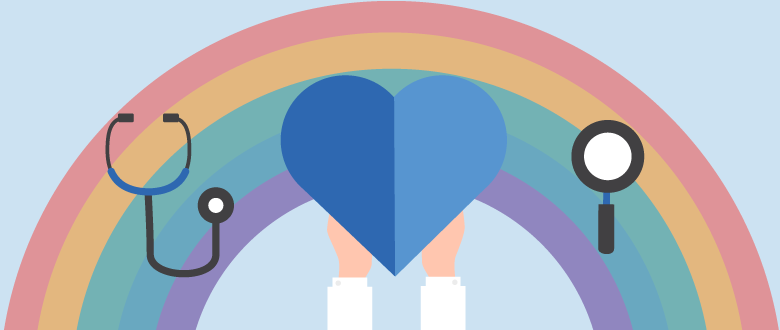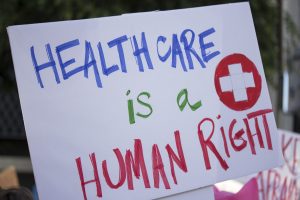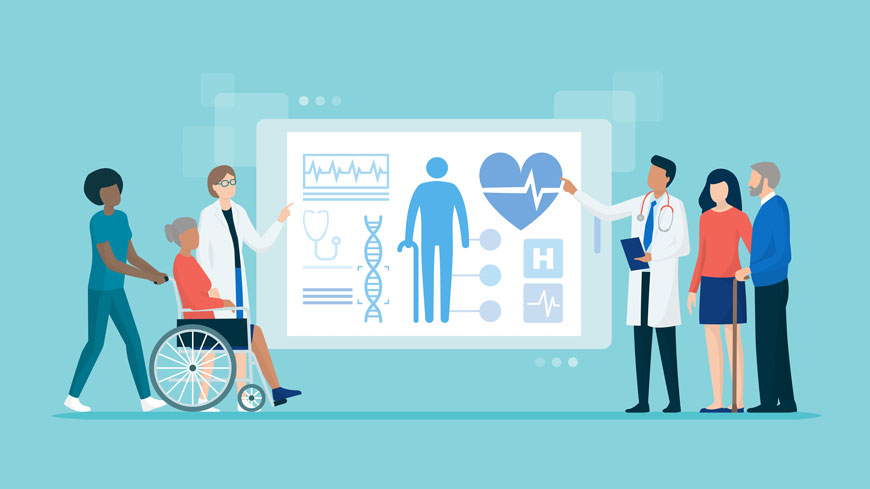
The Right to Health of LGBTI People in Armenia
It is no secret that in a number of developing countries, as well as in Armenia, the LGBTI community is still a vulnerable group, and vulnerable groups become twice as more vulnerable in emergency situations. Historically, medical services in our country have not been sufficiently accessible to the LGBTI community not in emergency situations, and not even in normal situations, and when it comes to the topics that are still considered to be taboos in post-Soviet countries (such as sexual health, gynecological/sexological issues), even people with the so-called “traditional orientation” often avoid going to the doctor, let alone the LGBTI community, which has been a victim of open hatred and discrimination for years. The century has changed but we still remain the same.
 One of the doctors we talked to (we do not mention his/her name at his/her request) considers the discrimination unacceptable, especially if it is the doctors who manifest it. “It directly contradicts the Hippocratic oath”. “All patients are equal, there is no nationality, no skin color, no sexual orientation for the doctor. We must adequately take care of everyone, staying true to our mission”.
One of the doctors we talked to (we do not mention his/her name at his/her request) considers the discrimination unacceptable, especially if it is the doctors who manifest it. “It directly contradicts the Hippocratic oath”. “All patients are equal, there is no nationality, no skin color, no sexual orientation for the doctor. We must adequately take care of everyone, staying true to our mission”.
Unfortunately, alongside those who work by this principle, there are not only doctors who are miles away from professionalism, but doctors who ignore even basic medical ethics. Referring to this painful issue, defense-lawyer Anahit Mkrtchyan notes that in her professional experience there have been cases when the ambulance staff refused to provide first aid to a patient simply because the latter was a representative of the LGBTI community. Sexologist Andronis Gharibyan thinks that the problem is deep and requires a complex solution, which is, raising awareness and improving the legal field. Thus, first of all, we need massive reforms in our educational system. At the Medical University, future doctors should not just get acquainted but thoroughly master the subject of medical ethics. According to Mr. Gharibyana homophobic lecturer was once a member of the ethics committee of the same university, who was trusted with the task of teaching ethics, despite the fact that the latter could use the chair entrusted to him to propagate violence against LGBTI people. So it is not surprising that the majority of current medical professionals in hospitals are so far away from medical ethics that they may even disclose personal information that is a medical secret.

Hakob, a member of the LGBTI community (his name has been changed at his request), speaks about the discrimination he has experienced in the healthcare system. He tells that the medical center refused to provide him with information on his health condition. The doctor insulted Hakob, saying that homosexuals have no rights and that he has more important things to do than listen to a homosexual. When Hakob insisted that he should immediately be provided with the necessary information in accordance with the law, the doctor said that he hadn’t got time. Because of this many homosexual people generally avoid seeking medical care.
There are often cases when instead of disrespecting an LGBTI person the doctor simply refuses to help. Dr. Andronis Gharibyan notes that in some cases the negative attitude towards LGBTI people by various professionals (doctors, lawyers) stems not from homophobia, but from the fear of being misidentified as an “LGBTI person”. The sexologist emphasizes that if any specialist starts working with community members, the patients’/customers’sexual orientiation and gender identity is automatically linked to the specialist providing them services, which օf course is not only absurd but a naive conclusion.
Legislative gaps restrict the full realization of LGBTI people’s right to health as well. Sexologist Andronis Gharibyan and lawyer Anahit Mkrtchyan share the same concern that the doctors who refuse to provide medical care to people are not held accountable. As there are no cases when a physician was held accountable for refusing to perform his or her professional duties, many other professionals practice this “refusing” approach as well. Incomplete application of a number of existing laws (the Law on Medical Aid and Service, Criminal Code of the Republic of Armenia) creates an atmosphere of impunity, in which the doctor can decide at his own discretion who to serve and who not.  The incomplete application of a number of existing laws (the Law on Medical Aid and Service, Criminal Code of the Republic of Armenia) creates an atmosphere of impunity for the doctors who become selective about who they want to provide care and support.
The incomplete application of a number of existing laws (the Law on Medical Aid and Service, Criminal Code of the Republic of Armenia) creates an atmosphere of impunity for the doctors who become selective about who they want to provide care and support.
Among the legislative gaps Anahit Mkrtchyan mentions the fact that homosexuality is still officially considered a mental disorder in Armenia, despite the fact that on May 17, 1990, according to the 10th revision of the WHO International Classification of Diseases, homosexuality was removed from the list of mental disorders and moved to the gender inconvenience department. Another issue that requires legislative regulation is that there is a ban on blood donation for homosexual people in Armenia, they do not even have the right to donate blood to save their relatives. The reason is that according to Article 15 (a) of Annex 2 to the Order of the Minister of Health which came into force in 2013 “On approving the procedure for the donor to undergo a free medical examination in order to maintain the health of the blood donor before taking the blood or its components and on the list of contraindications for donation “, in addition to the permanent contraindications excluding donation, the exclusion of blood transfusions is also based on belonging to certain risk groups, and in the context of this order homosexual people are classified as belonging to risk groups. Moreover, the order does not use the term “homosexual”, but (homoaddicted), which itself is a verbal expression of discrimination.

Lawyer Shushan Khnkoyan emphasizes that one of the most important issues requiring legal regulation is the gender affirming procedures for trans people as well. “The sphere of gender affirming procedures has many gaps in Armenia. There is no law regulating gender affirming procedures in Armenia. At present, one has to submit documents on their gender affirming surgery to make corrections, additions, or changes in their records at the Civil Registry Office which should be issued by a medical organization in accordance with the law of the Republic of Armenia. And since gender affirming surgeries cannot be performed in Armenia, trans people are sometimes forced to have surgeries outside Armenia, in the countries where it is legal. Ms. Khnkoyan concludes by noting that in order to improve the human rights situation for LGBTI people in Armenia, it is necessary to initiate legislative reforms by making changes in the above-mentioned and other legal acts.
Adding to the above-mentioned statement, lawyer Anahit Mkrtchyan is convinced that the adoption and proper application of the Law on Ensuring Equality before the Law will contribute to the protection of a number of rights of the LGBTI people, including the right to health. And although according to the Human Rights Protection Strategy of Armenia for 2020-2022, the action plan envisages the adoption of the law in the first half of 2020, but the first half of 2020 is over, and nothing has happened yet.
Thus summarizing the views expressed, it can be concluded that the adoption of the law on gender affirming procedures, the abolishment of discriminatory restrictions on blood donation, as well as raising awareness on discrimination and stigma and the prohibition of discrimination among health professionals through training sessions can significantly improve the LGBTI rights to health.
Author: K. A
The compilation and publication of this material has become possible within the framework of the project on Capacity Building and Empowerment for Protection of LGBTI Human Rights in Armenia implemented by New Generation Humanitarian NGO with the financial support of the Norwegian Helsinki Committee. The contents of this article are the sole responsibility of the author, and do not necessarily reflect the views of New Generation Humanitarian NGO or the Norwegian Helsinki Committee.




